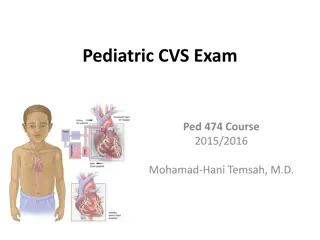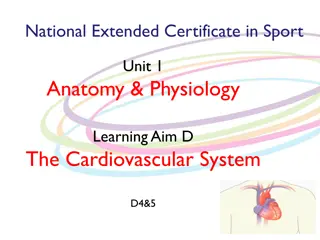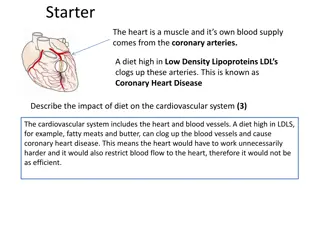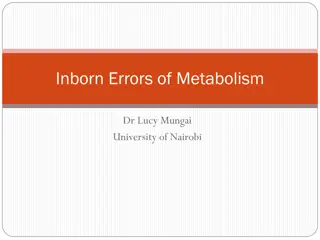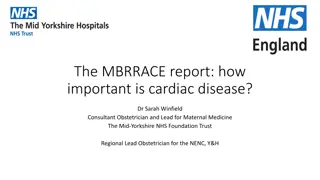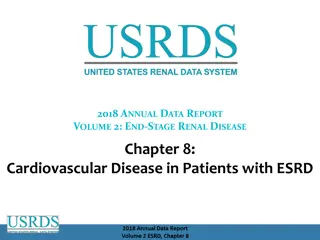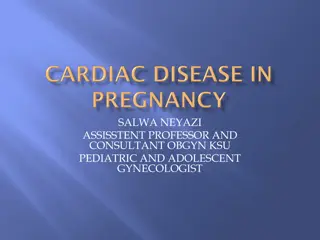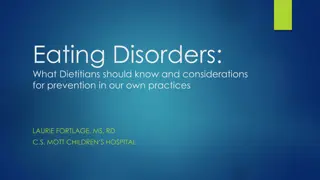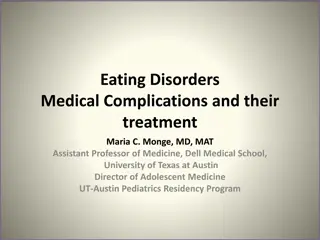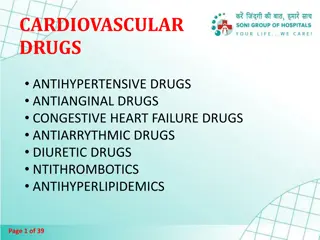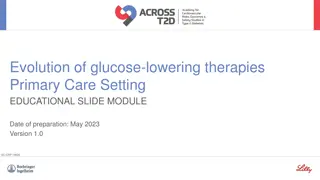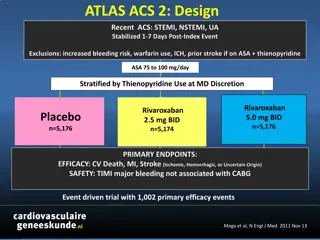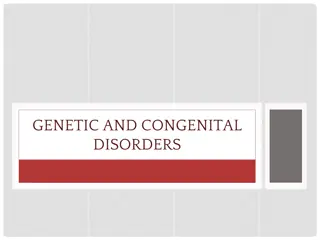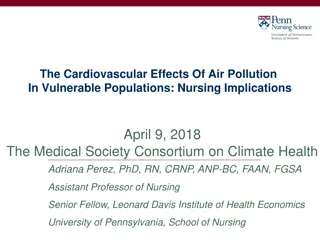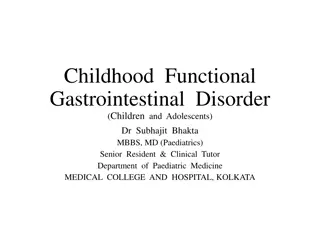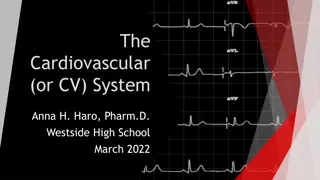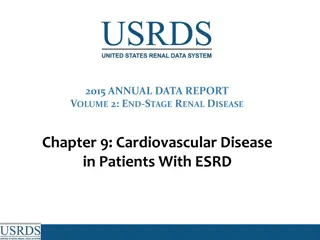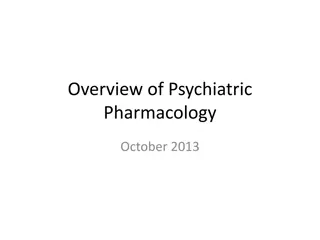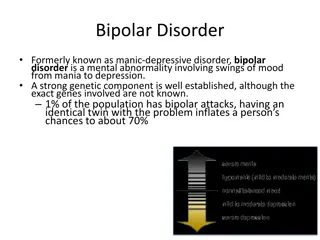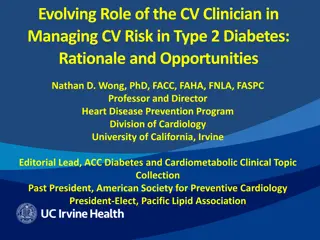Inflammation and Cholesterol Predicting Cardiovascular Events
This study explores how inflammation and cholesterol levels predict cardiovascular events among 13,970 statin-intolerant patients in the CLEAR Outcomes trial. Findings suggest residual inflammatory risk may be a stronger predictor than residual cholesterol risk for future events. The research analyz
0 views • 17 slides
Insights from the REPRIEVE Trial for Managing Cardiovascular Risk in Patients with HIV
Cardiovascular disease is a growing concern in individuals living with HIV, despite advancements in treatment. The REPRIEVE Trial sheds light on the importance of assessing cardiovascular risk and implementing primary prevention measures in this population. Dr. Grinspoon's financial disclosures and
0 views • 35 slides
The REPRIEVE Trial: Developing Cardiovascular Disease Prevention Strategy for People Living with HIV
The REPRIEVE trial focuses on developing a cardiovascular disease prevention strategy for individuals living with HIV. It addresses the increased risk of CVD in this population, even with good viral suppression. The study evaluates the use of pitavastatin, a statin with anti-inflammatory properties,
1 views • 33 slides
Pediatric Cardiovascular Exam Overview
Explore the differences between pediatric and adult cardiovascular exams, highlighting key differences in disease patterns, examination approaches, and objectives. Learn about the importance of distinguishing between routine well-baby exams and evaluations of ill children, along with step-by-step gu
6 views • 24 slides
CLEAR Outcomes Trial: Bempedoic Acid for Cardiovascular Prevention
The CLEAR Outcomes Trial investigated the effects of bempedoic acid, an ATP citrate lyase inhibitor, on cardiovascular outcomes in primary prevention patients. Results showed a reduction in cardiovascular events with bempedoic acid, particularly in patients intolerant to statins. Baseline characteri
1 views • 13 slides
Overview of Human Genetic Disorders
Human genetic disorders encompass a range of conditions, from recessive disorders like cystic fibrosis to dominant disorders such as Huntington's disease. Examples include cystic fibrosis, Huntington's disease, and sickle-cell anemia. Understanding genetic disorders involves research and awareness o
0 views • 10 slides
Overview of Anxiety and Related Disorders
Anxiety disorders, such as PTSD, panic disorders, phobias, agoraphobia, and OCD, are characterized by varying degrees of fear and distress. Anxiety is a normal response to danger, but when it becomes chronic, it can lead to debilitating conditions. PTSD occurs post-trauma, panic disorders involve in
1 views • 42 slides
Understanding Somatic Symptom Disorders, Conversion Disorders, and Dissociative Disorders
Somatic symptom disorders manifest as physical symptoms without apparent cause, while conversion disorders involve specific physical symptoms incompatible with medical conditions. Illness anxiety disorder involves interpreting normal sensations as disease symptoms. Dissociative disorders lead to a s
1 views • 41 slides
Effects of Exercise on the Cardiovascular System
Exploring the immediate and long-term effects of exercise on the cardiovascular system reveals the remarkable adaptations and responses the body undergoes. From short-term increases in heart rate and blood pressure to long-lasting changes in cardiac output, exercise plays a crucial role in enhancing
0 views • 13 slides
Impact of Diet on Cardiovascular Health
The impact of diet on the cardiovascular system is significant, with a high intake of LDL leading to clogged arteries and increased risk of Coronary Heart Disease. Regular exercise brings about positive changes in the cardiovascular system, enhancing heart function and oxygen delivery. Immediate ben
0 views • 7 slides
Understanding Inborn Errors of Metabolism and Metabolic Disorders
Inborn Errors of Metabolism (IEM) are genetic disorders that disrupt metabolic pathways, leading to substrate accumulation or product deficiency. These disorders can be classified based on toxic accumulation, protein metabolism, carbohydrate intolerance, lysosomal storage issues, energy production d
0 views • 29 slides
Understanding Co-occurring Mental and Physical Health Conditions
Co-occurring mental and physical health disorders are prevalent and require an integrative multidisciplinary approach for effective assessment and treatment. This holistic approach helps address the complexity of managing multiple disorders in an integrated healthcare setting. Through a multi-direct
1 views • 37 slides
Understanding Functional GI Disorders: A Comprehensive Overview
Functional GI disorders encompass a range of conditions affecting the gastrointestinal system, such as irritable bowel syndrome and disorders of the gut-brain interaction. These disorders are characterized by no structural abnormalities but are influenced by factors like motility disturbance, viscer
0 views • 42 slides
Morphologic and Physiologic Connections in Blood Pressure Waveforms for Cardiovascular Event Prediction
This report discusses the morphologic and physiologic connections in continuous blood pressure waveforms and their association with incident cardiovascular events. The study aims to assess if changes in arterial elasticity contribute to predicting CVD events and explores additional measures derived
0 views • 30 slides
The Importance of Addressing Cardiovascular Disease in Maternal Health
Cardiovascular disease remains a significant contributor to maternal mortality in the UK, with maternal deaths from cardiac issues outnumbering those from other direct causes, except thrombosis. The prevalence of cardiovascular risk factors in pregnant women, combined with a lack of consideration fo
0 views • 22 slides
Understanding Genetic Disorders and Their Impact on Health
Genetic disorders are caused by abnormalities in genes or chromosomes, leading to various health conditions. Inherited disorders can be passed down from parents to children, affecting physical makeup and processes in the body. In India, there is a high prevalence of genetic disorders, particularly i
1 views • 12 slides
Prevalence of Cardiovascular Disease in Adult ESRD Patients: 2016 Data Report
The data report examines the prevalence of cardiovascular diseases in adult End-Stage Renal Disease (ESRD) patients in 2016 by treatment modality and age. It includes information on various cardiovascular conditions such as atrial fibrillation, acute myocardial infarction, coronary artery disease, a
2 views • 25 slides
Understanding Cardiovascular Changes in Pregnancy
This informative content discusses the normal physiological changes of the cardiovascular system in pregnancy, symptoms and signs of cardiovascular disease, the impact of pregnancy on cardiovascular health, and the management of cardiovascular issues during pregnancy, labor, and the postpartum perio
0 views • 28 slides
Understanding Eating Disorders: Types, Signs, Effects, and Recovery
Eating disorders are mental disorders characterized by unhealthy eating habits and can have severe physical and psychological consequences. This article explores the definition of eating disorders, signs to look out for, different types such as Anorexia Nervosa, Bulimia Nervosa, Pica, and Purging Di
0 views • 10 slides
Understanding Eating Disorders: Insights for Dietitians
Eating disorders are complex neurobiological conditions that are not merely about control or weight management. These disorders can affect individuals of all genders, body sizes, and socioeconomic backgrounds. Dietitians play a crucial role in identifying, assessing, and treating eating disorders, a
0 views • 41 slides
Understanding Eating Disorders: Medical Complications and Treatment
This presentation by Dr. Maria C. Monge covers the common eating disorders in teenage patients, potential medical complications, and the role of the medical team in treatment. It includes definitions of disorders like Anorexia Nervosa, Bulimia Nervosa, and Binge Eating Disorder according to DSM-5 cr
0 views • 60 slides
Understanding Cardiovascular Drugs: An Overview of Treatment Options
Explore the world of cardiovascular drugs, including antihypertensive, antianginal, heart failure, antiarrhythmic, diuretic, antithrombotic, and antihyperlipidemic medications. Dive into the mechanisms of action, clinical indications, and adverse effects of these drugs, gaining valuable insights int
0 views • 39 slides
Understanding Neurodevelopmental Disorders in Childhood and Adolescence
Neurodevelopmental disorders in childhood and adolescence encompass a range of conditions including intellectual disabilities, communication disorders, autism spectrum disorder, and attention deficit/hyperactivity disorder. These disorders impact cognitive development, adaptive functioning, and comm
0 views • 30 slides
Understanding Sleep Disorders: Classification and Diagnosis
Sleep disorders encompass various conditions affecting sleep patterns and quality. They are classified into categories such as insomnia, sleep-related breathing disorders, central disorders of hypersomnolence, circadian rhythm sleep-wake disorders, parasomnias, and sleep-related movement disorders.
0 views • 32 slides
Understanding Grief and Depressive Disorders: A Comparative Analysis
Grief and depressive disorders share similarities but also have distinct differences. Grief is a universal emotional state following loss, while depressive disorders involve prolonged mood disturbances. The stages of grief include denial, anger, bargaining, depression, and acceptance, with intervent
0 views • 79 slides
Understanding Genetic Disorders and the Human Genome Project
The Human Genome Project, completed in 2003, aimed to identify all human genes and DNA sequences. Genetic disorders, like autosomal disorders and Huntington's disease, can result from mutations at different levels, affecting single genes, chromosomes, or multiple genes. Albinism and cystic fibrosis
0 views • 37 slides
Understanding Abnormal Psychology: Disorders, Symptoms, and Treatments
Explore the world of abnormal psychology through the lens of different disorders like depression, anxiety, and phobias. Learn about the definitions of abnormal behavior, DSM-V classifications, and various types of psychological disorders. Delve into the complexities of mental health conditions such
0 views • 39 slides
Evolution of Glucose-Lowering Therapies in Primary Care Settings
Cardiovascular effects of older glucose-lowering therapies and the history of cardiovascular outcome trials are discussed in this educational slide module. It outlines the timeline of treatment options from the discovery of insulin to the introduction of various medications. Evidence regarding the c
0 views • 29 slides
Investigating the Impact of Weekly Incretin on Cardiovascular Events in Diabetes
Individuals with type 2 diabetes have an increased risk of cardiovascular events compared to those without the condition. Research indicates that certain GLP-1 receptor agonists have shown promising results in reducing cardiovascular events in diabetic patients with specific HbA1c levels. However, t
0 views • 69 slides
Overview of Classification of Psychiatric Disorders
Psychiatric disorders are illnesses with various manifestations that impact functioning due to disturbances in biological, social, genetic, and other factors. Two key classification systems, ICD-10 and DSM-5, categorize over 200 types of psychiatric illnesses. The ICD-10 includes categories like org
0 views • 18 slides
Clinical Trial Results of Rivaroxaban in ACS Patients: ATLAS-ACS 2 Study
The ATLAS-ACS 2 study investigated the efficacy and safety of rivaroxaban in ACS patients post-index event. The primary endpoints included cardiovascular death, MI, and stroke, with significant reductions seen with rivaroxaban compared to placebo. Stent thrombosis was also reduced with rivaroxaban t
0 views • 10 slides
GripTrack: Innovative Device for Monitoring Elderly Health
GripTrack is a portable grip strength monitoring device designed to track cardiovascular and musculoskeletal health in the elderly population. It aims to provide an accurate early warning system by assessing grip strength, which can indicate cognitive decline, cardiovascular health, and frailty synd
0 views • 14 slides
Overview of Genetic and Congenital Disorders and Their Causes
Explore the terminology, causes, characteristics, and results of genetic and congenital disorders, as well as the disorders of single-gene inheritance. Learn about autosomal dominant disorders like Marfan Syndrome and Neurofibromatosis. Discover how single-gene disorders are inherited and their impa
0 views • 24 slides
Understanding the Cardiovascular Effects of Air Pollution in Vulnerable Populations
This presentation discusses the significant cardiovascular effects of air pollution, particularly on vulnerable populations such as older adults, women, and Latinos. It highlights the environmental factors contributing to cardiovascular health disparities and emphasizes the nursing implications for
0 views • 13 slides
Understanding Childhood Functional Gastrointestinal Disorders
Functional Gastrointestinal Disorders (FGIDs) in children and adolescents are characterized by chronic or recurring symptoms that cannot be fully explained by current structural or biochemical tests. These disorders emphasize the role of normal development in symptom presentation and the lack of evi
0 views • 46 slides
Understanding the Cardiovascular System: Anatomy, Physiology, and Function
Explore the intricate workings of the cardiovascular system, encompassing the heart, blood vessels, and blood circulation. Learn the anatomy, physiology, and function of this vital system, including the roles of arteries, veins, capillaries, and red and blue blood. Understand how the cardiovascular
0 views • 23 slides
Cardiovascular Disease in End-Stage Renal Disease Patients: Data Analysis 2011-2013
Understanding the prevalence and causes of cardiovascular diseases in patients with End-Stage Renal Disease (ESRD) is crucial for effective management. This report analyzes data from 2011-2013, focusing on the causes of death in ESRD patients, prevalence of cardiovascular diseases by treatment modal
0 views • 18 slides
Overview of Psychiatric Pharmacology: A Comprehensive Guide from 2013
This presentation delves into the nuances of psychiatric pharmacology, exploring common psychiatric conditions, historical perspectives on medical treatments, categories of psychiatric medications, and principles of treatment. It also touches on mental illness definitions from DSM-IV-TR and DSM-V, a
0 views • 27 slides
Understanding Mental Health Disorders: Bipolar Disorder, Anxiety Disorders, & More
Exploring various mental health disorders such as Bipolar Disorder, Anxiety Disorders, Generalized Anxiety Disorder, Panic Disorder, and Phobic Disorders. Learn about their symptoms, prevalence, and impacts on individuals' lives.
0 views • 41 slides
The Evolving Role of Cardiovascular Clinicians in Managing Type 2 Diabetes Risk
The role of cardiovascular clinicians in managing cardiovascular risk in patients with type 2 diabetes is evolving, with a growing emphasis on collaboration with multidisciplinary teams. Recognizing the potential benefits of certain diabetes medications on cardiovascular outcomes, clinicians are urg
0 views • 25 slides



